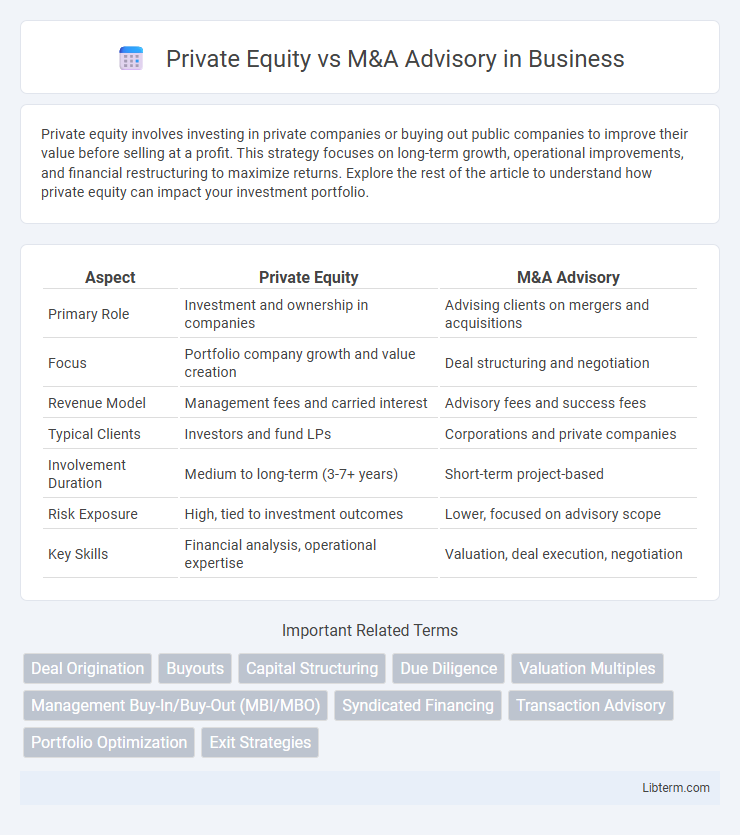Private equity involves investing in private companies or buying out public companies to improve their value before selling at a profit. This strategy focuses on long-term growth, operational improvements, and financial restructuring to maximize returns. Explore the rest of the article to understand how private equity can impact your investment portfolio.
Table of Comparison
| Aspect | Private Equity | M&A Advisory |
|---|---|---|
| Primary Role | Investment and ownership in companies | Advising clients on mergers and acquisitions |
| Focus | Portfolio company growth and value creation | Deal structuring and negotiation |
| Revenue Model | Management fees and carried interest | Advisory fees and success fees |
| Typical Clients | Investors and fund LPs | Corporations and private companies |
| Involvement Duration | Medium to long-term (3-7+ years) | Short-term project-based |
| Risk Exposure | High, tied to investment outcomes | Lower, focused on advisory scope |
| Key Skills | Financial analysis, operational expertise | Valuation, deal execution, negotiation |
Introduction to Private Equity and M&A Advisory
Private Equity involves investment firms acquiring ownership stakes in private companies to drive growth and generate returns through strategic management and operational improvements. M&A Advisory encompasses specialized services offered by financial experts to facilitate mergers, acquisitions, and corporate restructuring, providing valuation, negotiation, and due diligence support. Both fields require deep financial expertise but differ in approach, with Private Equity focusing on ownership and value creation, while M&A Advisory centers on transaction execution and deal advisory.
Defining Private Equity: Core Functions and Services
Private Equity firms invest directly in private companies or execute buyouts of public companies to streamline operations and drive growth. Core functions include raising capital from institutional investors, conducting thorough due diligence, and actively managing portfolio companies to enhance value. Services extend to strategic guidance, financial restructuring, and preparing companies for profitable exits through sales or public offerings.
Understanding M&A Advisory: Roles and Responsibilities
M&A advisory involves providing strategic guidance to companies during mergers, acquisitions, or divestitures, focusing on deal sourcing, valuation, negotiation, and due diligence. Advisors play a critical role in structuring transactions, managing risks, and ensuring regulatory compliance to maximize shareholder value. Unlike private equity firms that invest capital directly, M&A advisors facilitate transactions by connecting buyers and sellers and optimizing deal terms.
Key Differences Between Private Equity and M&A Advisory
Private Equity firms invest capital directly into companies by acquiring equity stakes, aiming to generate returns through growth and eventual exit strategies, while M&A Advisory firms provide strategic guidance and advisory services for mergers, acquisitions, and divestitures without direct investment. Private Equity involves hands-on management and operational improvements in portfolio companies, contrasting with M&A Advisory's role centered on deal structuring, valuation, and negotiation facilitation. The key difference lies in Private Equity's ownership and value creation focus versus M&A Advisory's consultancy-based, transactional expertise.
Deal Sourcing and Origination: Who Does What?
Private equity firms primarily focus on deal sourcing by leveraging proprietary networks, industry relationships, and market intelligence to identify and evaluate potential investment opportunities. M&A advisory firms concentrate on origination by actively marketing companies for sale, conducting detailed buyer outreach, and facilitating negotiations to generate transaction leads. While private equity acts as a principal investor pursuing deals, M&A advisors serve as intermediaries connecting sellers and buyers throughout the deal origination process.
Fee Structures and Compensation Models
Private Equity firms typically earn fees through management fees averaging 2% of committed capital and carried interest around 20% of profits generated from investments, aligning compensation with fund performance. M&A Advisory firms usually operate on success fees, often between 1% to 3% of the transaction value, supplemented by retainer or hourly fees during the deal process. The contrasting models emphasize ongoing portfolio management rewards in Private Equity versus deal-specific compensation in M&A Advisory services.
Required Skills and Typical Career Paths
Private Equity professionals require strong financial modeling, due diligence, and portfolio management skills, often progressing from roles in investment banking or consulting to senior investment positions managing fund assets. M&A Advisory experts focus on transaction structuring, client relationship management, and negotiation, typically starting as analysts or associates in investment banks or boutique advisory firms before advancing to advisory or deal leadership roles. Both fields demand deep market knowledge and analytical expertise, but Private Equity careers emphasize long-term investment strategies while M&A Advisory centers on deal execution and client advisement.
Impact on Companies and Stakeholders
Private equity firms drive growth by injecting capital, operational expertise, and strategic guidance into portfolio companies, often leading to enhanced efficiency and value creation for stakeholders. M&A advisory services facilitate transactions by providing market insights, valuation expertise, and negotiation support, enabling companies to achieve strategic objectives such as expansion, diversification, or consolidation. The impact on stakeholders varies, as private equity involvement may lead to significant organizational changes and potential value appreciation, while M&A advisory helps ensure transaction alignment with shareholder interests and market opportunities.
Industry Trends and Market Dynamics
Private Equity firms increasingly target technology, healthcare, and renewable energy sectors due to high growth potential and disruptive innovations, driving competitive deal environments. M&A Advisory services have evolved to incorporate advanced data analytics and digital deal sourcing to meet rising client demands for efficiency and precision in valuation and due diligence. Market dynamics reveal growing cross-border transactions and regulatory complexities, prompting both Private Equity and M&A advisors to enhance compliance expertise and strategic partnership networks.
Choosing Between Private Equity and M&A Advisory
Choosing between private equity and M&A advisory depends on your career goals and skill set, as private equity focuses on investing capital into companies for long-term growth, while M&A advisory specializes in facilitating mergers, acquisitions, and corporate restructuring. Private equity professionals analyze market opportunities, perform due diligence, and actively manage portfolio companies to maximize returns, whereas M&A advisors provide strategic guidance, valuation, deal structuring, and negotiation services to clients. Understanding the differences in deal involvement, risk exposure, and compensation can help determine which path aligns best with your professional aspirations in finance.
Private Equity Infographic

 libterm.com
libterm.com